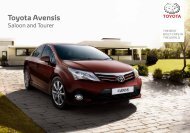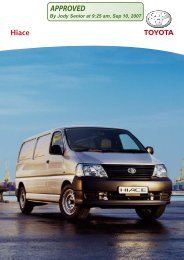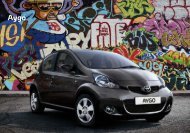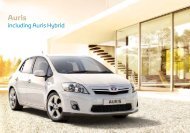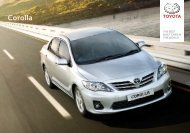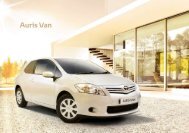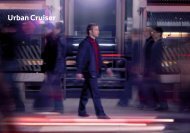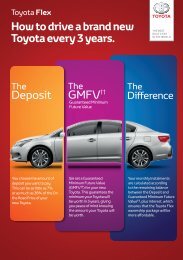Toyota Environmental Sustainablity Report
Toyota Environmental Sustainablity Report
Toyota Environmental Sustainablity Report
You also want an ePaper? Increase the reach of your titles
YUMPU automatically turns print PDFs into web optimized ePapers that Google loves.
Special Story<br />
Herman Van Rompuy<br />
President of the European Council<br />
together with Didier Leroy, President &<br />
CEO of <strong>Toyota</strong> Motor Europe<br />
"The recent tragic events in Japan showed us how important<br />
global debates on energy are. In the light of these events, I<br />
should like to express my sincere condolences to all those<br />
affected.<br />
Energy, climate change and green growth are major topics for<br />
the European Union. They are of great strategic importance<br />
for the EU and truly linked with its competitiveness.<br />
That is why I have decided to discuss these topics at the<br />
highest political level in the European Council. The choice for<br />
sustainable growth is one of the key pillars of the EU economic<br />
strategy for 2020.<br />
In the fi eld of climate change, the EU has been a pioneer<br />
in developing ambitious climate policies that give the right<br />
incentives to the market. In 2009, ambitious targets were set.<br />
Two of them are binding: reducing greenhouse gas emissions<br />
with 20% by 2020 and increasing the share of renewable<br />
energy in the EU’s energy mix to 20% by 2020. Today these<br />
targets are fully on track. The non-binding target to achieve<br />
20% more energy effi ciency by 2020 is currently not on track.<br />
In order to reach this target, leaders agreed at the European<br />
Council of 4 February 2011 to undertake all necessary<br />
efforts.<br />
The need to tackle climate change in line with the 2°C goes far<br />
beyond 2020. That is why the EU supports a 2050 objective<br />
to lower emissions by 80% to 95% in the context of necessary<br />
reductions by developed countries as a group. The recent<br />
Commission Communication on the low carbon roadmap<br />
Sustainable Development<br />
towards a Low Carbon<br />
Economy in the EU<br />
We are pleased to include this contribution<br />
from Herman Van Rompuy, President of<br />
the European Council, on his thoughts on<br />
what sustainable development in Europe<br />
should entail.<br />
Piet Steel<br />
towards 2050 gives an overview of the challenges at stake and<br />
possible intermediate steps. Further changes of our transport,<br />
our buildings, our households to make them more ‘green’ will<br />
be necessary if we want to achieve this goal.<br />
To create a low carbon and resource-effi cient society, the<br />
necessary investments and market incentives are needed.<br />
That is why leaders agreed at the February European Council<br />
to further promote investment in low carbon technologies and<br />
asked the Commission to table new initiatives on smart grids<br />
and green vehicles. With a view to reducing emissions from<br />
transport, a number of actions have already been taken by<br />
the EU over the last number of years, but an ongoing focus<br />
will be needed.<br />
Companies remain driving forces of the path towards<br />
sustainability. Without their cooperation, targets would remain<br />
just that: targets. However with their cooperation, we can<br />
really reach the goals. I wish to thank <strong>Toyota</strong> for its support<br />
of European policies. Car industry will remain to play a crucial<br />
role here.<br />
I am deeply convinced that Japan and its citizens will fi nd the<br />
way back towards hope and recovery. The EU remains ready<br />
to give its full support.”<br />
Herman Van Rompuy<br />
President of the European Council<br />
<strong>Toyota</strong> European Sustainability <strong>Report</strong> 2011 I <strong>Environmental</strong> Performance<br />
11




